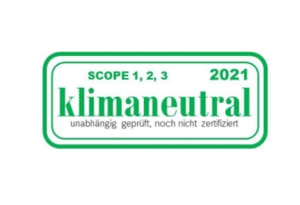SBRS GmbH is Climate Neutral
Climate neutrality achieved in 2021 for Scope 1 to 3 – SBRS offsets 400 t CO2
Climate neutrality and sustainability are hot topics today – and quite right too! Something has to change. We all need be more conscious of our use of the earth’s resources.
SBRS GmbH, or rather two of its senior employees, were nominated for the German Environmental Award in 2021, primarily thanks to the SBRS business model. All of the projects we have realised are sustainable, both when refurbishing trains and in the field of electro mobility. It goes without saying that we use green electricity at the company’s site.
Although it is very difficult to avoid CO2emissions altogether, because for instance the supply of materials needs to be guaranteed and the employees have to somehow get to work, we succeeded in achieving climate neutrality this year!
In order to assess CO2emissions, the various scope levels need to be considered. CO2 emissions are divided into three categories:
- Scope 1: Direct emissions
- Scope 2: Indirect emissions from energy sources
- Scope 3: Indirect emissions due to the use of services, business travel.
Many companies initially focus on scopes 1 and 2, even though these CO2emissions – depending on the company – account for less than 50% of the total emissions; scope 3 is therefore clearly the most significant.
It is not easy to draw up a CO2 balance for any particular company. We use the ecocockpit tool issued by the Effizienz-Agentur NRW. This tool is well structured and shows very quickly and most impressively, which of the issues are having a negative impact
Direct emissions (scope 1) at SBRS are primarily the result of company vehicles.
At our site, electricity is drawn from renewable sources, so in this case no contribution can be booked to scope 2. In terms of C02 emissions, the district heating system we use was our best choice; however, it still accounts for a significant proportion of the CO2 balance.
The largest contribution, and the most difficult to determine, comes from scope 3, where flights, especially over long distances, have the greatest impact We are currently working on a project in Mexico, for which our employees have to be on site and therefore need to use air travel. The net result of our employees commuting to our location in Dinslaken is not CO2 neutral either, as already mentioned above however “home office mode” has had a positive impact on this in 2021.
In summary, the following picture emerges for the year 2021 (conservatively extrapolated and including a safety factor of 10 %): a total of 385 t of CO2 was produced.
This post is also available in: German



